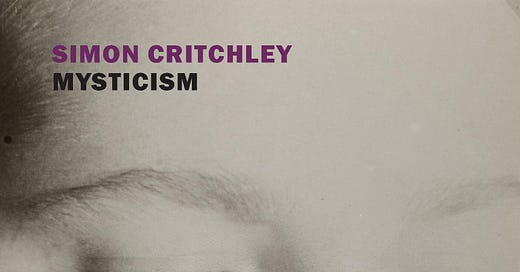Dear Reader,
You are reading Between the Lines, where members of the Polymath Circle open their personal libraries. In this series, we’ll explore the books that have shaped our journeys and left lasting imprints on our lives… Enjoy!
“To write is to aspire towards, even to hope for, the mystery of a clearing that is other than the self, the vast windowless sunlight room of living experience”.
In preparation for our upcoming discussion on Interior Castle by St Teresa of Ávila, I wish to mention Mysticism by Simon Critchley (the book I flashed on the screen in two previous meetings) as a suggested read.
Critchley defines mysticism as — the cultivation of practices that allow you to free yourself of your standard habits, your usual fancies, and imaginings, and see what is there and stand with what is there ecstatically. A mystical journey can serve as a form of healing that traditionally focuses on the culmination in union with the divine, though it does not have to. As a philosopher by profession, Critchley questions modern philosophy’s opposition to mysticism due to its rigid obsession with critique. He asserts that mysticism is described by personal transformation that requires and is enabled by concepts and is deeply philosophical.
Female autobiography finds its origins in mystical writing. As an avid memoir reader, Critchley guided me in understanding what sets a compelling autobiography apart from a dull one: framing it as the self’s internal, dialectical struggle; a division that resonates within the structure of religious narrative.
The work is divided into three parts. The first delves into themes of mysticism. The second part examines the journeys of figures such as Julian of Norwich (the heroine), Anne Carson, Annie Dillard, T.S. Eliot, and Nick Cave. A quote from the back cover—“Wouldn’t you like to taste this intensity?”—reads like an invitation to pick up the book. The third part explores how mysticism can be integrated into the modern aesthetic experience—a taste for the reader.
Mystical experiences live on in art and poetry, but we should avoid reducing them to personal or secular interpretations that strip away their communal essence. Seeing the world aesthetically allows us to engage with the metaphors, symbols, and images we encounter. Critchley believes it is impossible to be an atheist when listening to the music that one loves, and the experience of music is perhaps the closest we get to feeling and communicating with an animated universe. Musical ecstasy can be experienced by giving in, giving up, giving oneself over to sound — a merge. I feel this merging, releasing all of my frustration, every time I listen to Hyperballad by Björk.
In moments of ‘Idiot Glee’ (coined by Peter Schmidt and Brian Eno) sheer mad joy, we can be saved from ourselves and from thinking the worst of others. In my view, mysticism speaks to the deep spiritual desire that many of us experience: feeling lost, unable to believe, yet still driven by a profound desire for belief. It's not about the temporary excitements that come and go, but about finding fulfillment in the steady, unwavering force of genuine connection.
I’m excitedly awaiting our next meeting and what we stand to gain from allowing our minds to tap into intuition and expanding the field of consciousness to the vastness that goes beyond the repetitive nature of being ourselves.
Is our existence larger than we think?
Read Mysticism by Simon Critchley
Riya Bhilegaonkar is a data scientist who shares personal anecdotes on her Substack, to new heights .




💕💕🥳